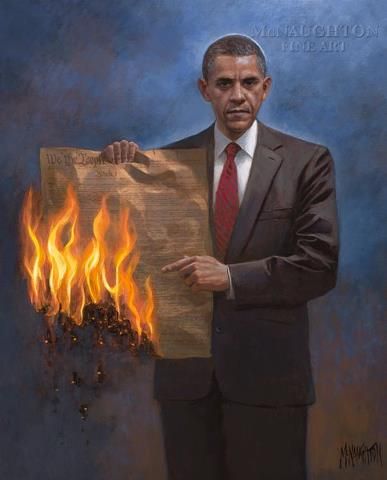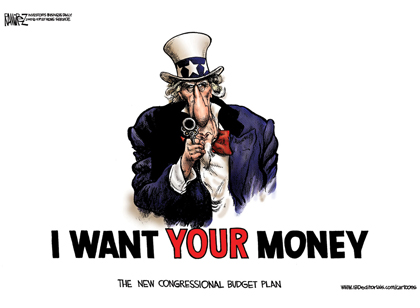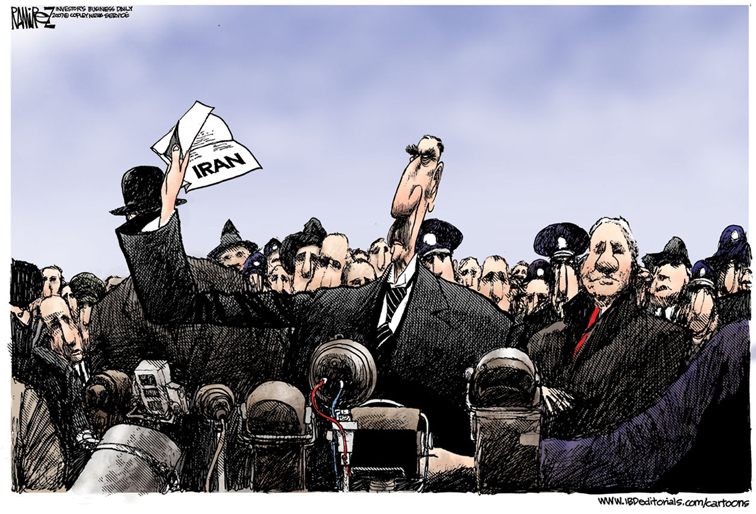George Washington -
"Towards the preservation of your government, it is requisite, that you resist with care the spirit of innovation upon its principles. One method of assault may be in effect alterations which will impair the energy of the system and thus undermine what cannot be directly overthrown."This statement made by Washington was a warning to future generations of Americans. Warning each generation that followed away from the temptation of undermining the principles of the Constitution, the very foundation of our Republic. It was also a warning that , "alterations, " on these principles would in effect change the fabric and meaning of the very laws established in the Constitution and as such the building blocks of our nation.
The vast size and scope of the Federal Government is one glaring instance in which the warning given by George Washington was ignored. While the, "size, " of the Federal Government is not specifically mentioned in the Constitution, the authority, responsibilities and duties of the Government are. In each case this authority is limited in its scope and size by that fact that the Framers established specific obligations that the people should expect from government.
While the Framers could not anticipate the tremendous growth that this nation has experienced since it founding, they did anticipate that a government that exists by the authority of the governed must be limited in its power over the citizenry lest it cease to be a government of the people but one that dictates to and controls the people.
Each Branch of the Federal Government has specific Constitutional responsibilities that are outlined for that Branch.
Article I, Section 8 - Congress, ( Legislative Branch), has power to: collect taxes, pay
debts, borrow money, regulate commerce with foreign nations,
establish rule of naturalization, coin money, provide
punishment for counterfeiting,
establish Post Offices, promote Science,
constitute tribunals, punish piracy on the seas, declare war, raise and support armies and Navy and have exclusive legislative
authority over the District of Columbia.
Article II, Section 2 - The President, ( Executive Branch), Commander in Chief of the military, power to make treaties, nominate and appoint Ambassadors, public Ministers, Judges and all other offices, grant reprieves and pardons, recommend to Congress Measures necessary and expedient, convene or adjourn Congress,
receive Ambassadors and other public
Ministers, Commission all Officers of The United States and see that laws are faithfully executed.
Article III, Section 2 - The Courts, (Judicial Branch), power to extend to all cases of law arising under the Constitution and treaties, the trial of crimes and treason.
These are the specific powers granted to the Federal Government by the Constitution. While the scope of these powers can vary, understanding
their limitations in size and power, the
history of this nation and its founding and Founders must be taken into consideration.
While Great Britain governed America as colonies of the British Empire, the original 13 Colonies were subject to a
myriad of oppressive regulations, harsh policies, unrepresentative and oppressive taxation , excessive laws and violations of personal freedoms such as speech, property holdings, protection against
unwarranted searches and
seizures, just to name a few of the
oppressive governance by Britain over the Colonies.
To prevent similar authoritative and oppressive power from
controlling the United States as a nation in the manner that Britain
controlled the Colonies, the Founding Fathers
envisioned a government that would be limited
in its power and authority and would be given that authority by the people of The United States thus directly answerable to the citizenry.
This very pretext of government established by the Constitution and
envisioned by the Framers created a government limited in size, scope and power to prevent needless and
oppressive regulation and legislation, the trampling of individual freedoms and liberties and to allow the individual States the power and freedom to handle situations particular to that State.
The Federal Government was designed in fact by the Framers only as a central authority with limited power whose main responsibility was to protect the nation by providing for its defense, institute a nationally regulated form of law and justice so that every citizen would be allowed the same rights and
privileges throughout the land, establish commerce between states and foreign nations and also establish diplomatic relations, commerce, trade and treaties with foreign powers.
The size, power and authority of today's Federal Government far
exceeds the vision established in the Constitution and by its Framers. Slowly and surely over the decades many of our freedoms have been regulated, legislated and
controlled by an
unfettered growth and power from a government that in many ways no longer answers to the authority
of the people but to the power of those elected.
The Federal Government was established to guard and secure our freedoms not to legislate, tax and regulate the people into dependents and in a very real sense servants of the government.
In 1788 during the Constitutional ratifying Convention in New York, Alexander
Hamilton described the Federal Government as follows:
"The great leading objects of the federal government, in which revenue is concerned, are to maintain domestic peace, and provide for the common defense. In these are comprehended the regulation of commerce that is, the whole system of foreign intercourse; the support of armies and navies, and of the civil administration."Hamilton described a government limited in power yet created for the security and cohesiveness of the nation.
In 1821 Thomas Jefferson warned of the consequences of an unfettered and limitless government:
"When all government, domestic and foreign, in little as in great things, shall be drawn to Washington as the center of all power, it will render powerless the checks provided of one government on another."The vision of the Founders and Framers of the Constitution for the Federal Government have been left behind in the regulatory, burdensome, exhaustive, over reaching and over taxing government that now leads this nation. Its power is limitless, and its influence and intrusion in the lives of We the People have already begun to crumble the foundational principles on which this nation was founded.
Ken Taylor



























